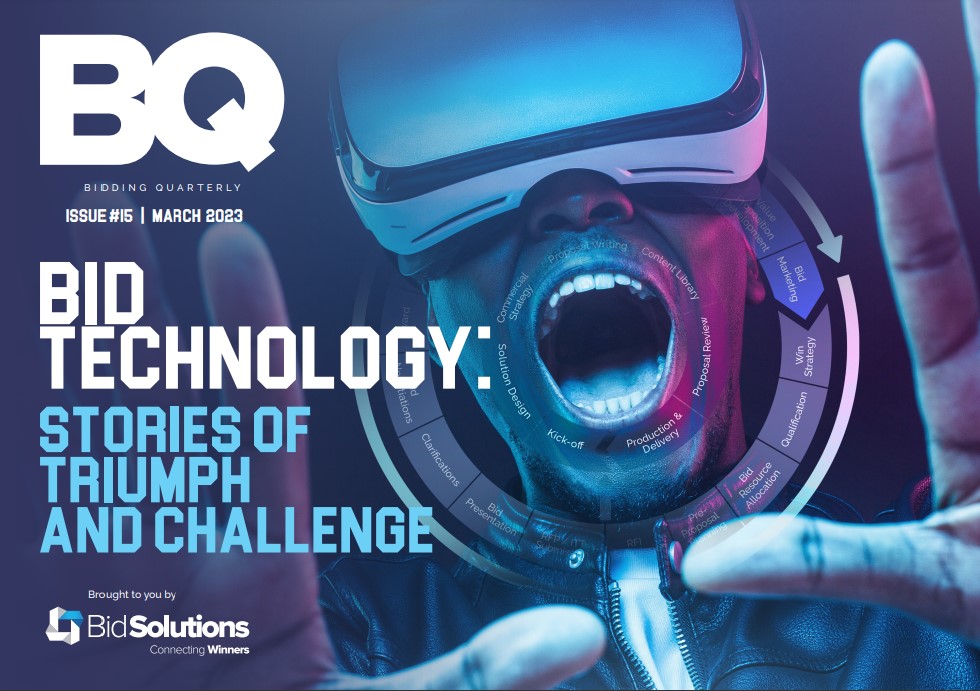
I began my bidding career in the early nineties, when developing a bid normally involved a group of people working together under the direction of a Bid Manager to agree a strategy, design a solution, make up a price, and then write it all down according to the tender instructions. Fast forward to 2023 and this still sounds a familiar way of doing things, even with the advances in technology over the last 30 years.
How does technology play a part?
It seems as though the role of technology has thus far been as an enabler to take the heavy lifting off humans. But has it? Do people working on bids have more free time than before? Are they able to work on more bids? Produce better quality? More likely to meet deadlines? Only you will know the answers to these questions, but it can be argued technology has so far failed to deliver on all its promises.
If necessity is the mother of invention, why hasn’t the use of technology progressed more? Many bid professionals still recognise a PowerPoint kick-off deck, an Excel bid plan, and Word proposal all saved in SharePoint and emailed using Outlook. I’m not criticising Microsoft 365; my point is people rarely venture out of their technology comfort zones, especially when they’re under pressure.
People and technology
Unless you’re a one-stop bidding shop producing bids by yourself, you’re going to rely on a team of people to contribute. That’s where things get a bit tricky. You’re at the mercy of time-poor people to give you high-scoring responses that align with your strategy, answer the question, influence the evaluator, and meet the word/page limits when you need them to.
Strategically important bids can hinge on one person delivering the goods on time. Bid Managers quickly learn the art of persuasion and diplomacy to extract information – any information, never mind whether it’s well written and remotely related to the bid they’re working on. So, can technology help them?
There are many software solutions aimed at the bidding market, but I wonder how effective they are in the hands of a subject matter expert (SME) at 1am. Could these specialist apps prevent them pulling an all-nighter in the first place? I’ve never known an SME who doesn’t resort to their email/Word comfort zone in a time of crisis. I’ve met hundreds of deeply knowledgeable SMEs who can design complex IT solutions but can’t use Word beyond making characters appear on the screen. Give them a specialist bidding tool? Forget it.
What isn’t working?
Maybe we’re looking at it the wrong way round. Instead of technology enabling people, what if technology just took over? Here comes AI.
AI might be as old as digital computing, but its time is very much of the moment. So let’s indulge in a spot of ‘Tomorrow’s World’ for bidding.
Imagine a government ministerial department procuring highly regulated and nationally critical services. Contracts can be worth billions of pounds. If something goes wrong, the Prime Minister and the press hear about it. Procurements can last years, cost millions and still don’t guarantee successful outcomes. Check out the National Audit Office if you need convincing. Awarding these contracts still comes down to two opposing teams of people reaching an agreement. But what if it didn’t need to?
What if the department could use AI to constantly collect and analyse data in minute detail about how it functions financially and operationally – far more than the people who work there ever could? AI could forecast what’s needed in the short, medium, and long term, and instantly procure those goods and services at the optimal time from vetted suppliers. Procurements would take a fraction of the time with minimal human intervention (perhaps as an approver with the final say as part of ethical governance).
AI would use a vast array of data to develop the specification. It would determine what the department needs and what the market can offer, both now and in the future. It would know what the department can afford, what makes a competitive price, formulate a contract, evaluate and model risk, and decide which suppliers to approach (with suppliers also vetted by AI).
The ‘invitation to tender’ and ‘proposal’ would be machine-to-machine interactions, where suppliers receiving ‘invitations’ use AI to respond instantaneously with a compliant solution that’s modelled for risk and value over the contract term. Contracts could be signed instantly without protracted negotiations.
Now let’s add quantum computing to the mix. It’s hard to imagine where this will take society, but let’s stay with bidding for now! Using the scenario above, if AI can specify a requirement, and respond with a proposal, the speed and depth of the evaluation using quantum computing is hard to comprehend (for me anyway). A massively complex ten-year service involving multiple suppliers could be modelled for every and any scenario in seconds. What will fail and when? Where will costs rise and fall? When will delays be incurred? How will risk and opportunities play out? Remember that AI and quantum computing are already a reality.
Back in the room
I was about to write that all this seems far-fetched, and maybe it is. But when His Majesty’s government spends £1,058.2 billion every year, perhaps using technology underpinned by standards to derive better and more assured outcomes in less time is not such a bad idea after all.
I’m going to avoid saying this can’t happen in case future generations mock me, but I do think we need to reimagine the art of the possible. And if you wish bidding was easier, be careful what you wish for.
This article was written by Jon Darby.
Jon has 25 years’ bid and capture experience in winning complex public sector tenders in the aerospace, defence, IT services and healthcare markets. This includes leading and managing international teams on deals worth up to £3.5 billion. Jon received APMP UK’s Industry Innovation Award in 2020. He is committed to advancing the bid and capture profession as a valued career of choice. He has volunteered on the APMP UK board for seven years (including as Chapter Chair). Jon regularly speaks at conferences, live events and webinars.

